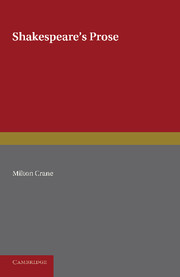Summary
Behind Shakespeare's use of prose lies the history of the prose convention in the Elizabethan drama. The term is ambiguous, for no single convention governed the use of prose in the English drama at the beginning of Shakespeare's career. There were, instead, several conventional uses of prose which were apparently unconnected: prose was used for letters and proclamations, for the representation of madness, and for comic matter. None of Shakespeare's predecessors seems to have been aware of a dramatic principle unifying these uses; and virtually the same eclecticism characterized the work even of some of Shakespeare's contemporaries and successors.
The origins of those first conventional uses remain more or less obscure. Definite proof is lacking, but in all likelihood common experience furnished the idea for letter- and proclamation-prose. The well-known elaborate and heavy prose of the typical proclamation, for example, made it impossible for a dramatist to present verse proclamations on the stage. One cannot tell how or when empirical information combined with a developing sense of dramatic decorum to produce a convention.
Mad prose offers a similar problem. The figuring of insanity by some sort of incoherent speech or babbling satisfied the Elizabethan playgoer, whether or not he had first-hand experience of mad speech. At some point in the development of this usage, it became understood that the speech of the lunatic was prose, and not broken verse. Thus usage was transformed into convention.
The use of prose for comic matter appears to have grown out of doggerel or “tumbling verse,” which was confused with—and eventually became—prose. A sense of the realistic nature of comic action doubtless contributed to the ready acceptance of this use of prose. Closely allied to comic prose was the more general use of prose for low characters. In speaking of the early drama, one may appear to be drawing a distinction without a difference, since most of the low characters are comedians; but the independent development of comic prose and prose for people of lower social classes indicates that the divergence goes back to an earlier differentiation.
- Type
- Chapter
- Information
- Shakespeare's Prose , pp. 188 - 196Publisher: Cambridge University PressPrint publication year: 2013



